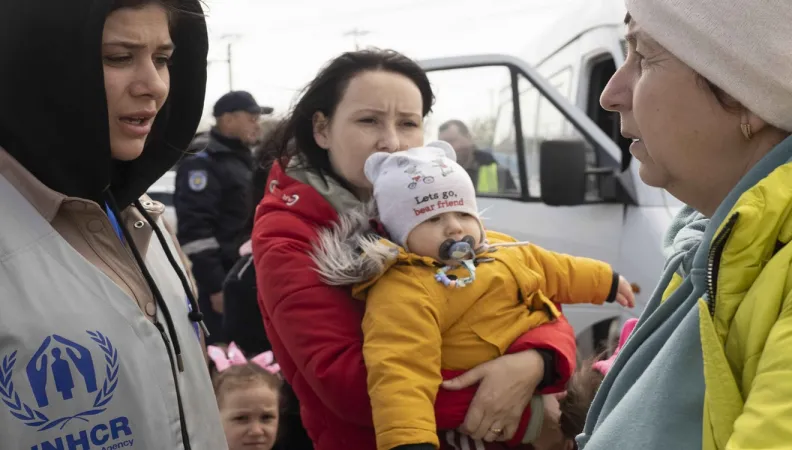Share the page
Taking Action to Defend the Rights of Refugees
Published on

How can we better protect refugees forced to flee their countries to escape conflict or persecution? As World Refugee Day draws attention to the plight of refugees on June 20, let's take a look at three examples of AFD Group projects on the ground, in cooperation with civil society organizations.
SENEGAL: PROTECTING THE RIGHTS AND DIGNITY OF REFUGEES AND THEIR FAMILIES
In Senegal, the number of arrests for migration-related offenses has risen, but this has not been accompanied by an increase in access to justice. The lack of lawyers, access to legal aid, or even representation in the event of prosecution for an offense can hamper access to justice for detained migrants. The civil society organizations (CSOs) working in prisons are not trained in immigration law either, and there is little documentation on the subject.
Close to 2,000 people have died each year in their attempt to cross the Mediterranean, and thousands more die or go missing while trying to reach Spain’s Canary Islands. Families find it extremely hard to find out what has happened to their loved ones.
The project led by French NGO Cimade, and implemented with the Migration and development network ("Réseau pour la migration et le développement - Remidev)" in Senegal, aims to improve detained migrants' access to rights and to accommodate families searching for loved ones that have disappeared or died. Their work ranges from data collection to the organization of workshops, and training. The project reaches close to 600 indirect beneficiaries (detained migrants and families of missing persons).
The project's aims include the following:
- Reinforcing the capabilities and knowledge of civil society partners
- Documenting situations and practices
- Raising awareness among civil society and specialized players
- Encouraging best practices among those working with detained migrants and their families
Further reading: AFD and Fondation de France to Support Ukrainian Refugees in Moldova
Reinforcing MOLDOVA’S SOCIAL COHESION AND RESILIENCE IN THE FACE OF THE CRISIS IN NEIGHBORING UKRANIA
In Moldova, Europe's poorest country, the arrival of Ukrainian refugees is putting pressure on the services offered to the population, thereby increasing the risk of tension between the Moldovan host population and refugees.
The project led by the Synergies consortium (including Solidarités international, Humanité & Inclusion, and Médecins du monde), through local partners, aims to improve the integration of Ukrainian refugees in Moldova, thereby preventing the risk of social tensions between the two communities. The project aims to strengthen the capabilities of eight Moldovan CSOs working in the fields of health, education, employment and inclusion of people with disabilities.
The purpose of this project is to:
- Strengthen the skills of civil society to better manage the reception of refugees
- Boost public education, early childhood and health services to meet the needs of national and refugee populations
- Improve refugees' access to education and employment
"Through the work of our partners, we are already seeing the benefits of the project among the local communities,” says Ana Palii, the project manager. “The work of the Moldovan CSO CIDSR (Center for Reproductive Health Education), for example, has brought Moldovan and Ukrainian children together for excursions and educational activities, and has also improved the space in reception areas, including toilets for children with reduced mobility. "
Further reading: AFD and migration
DEFENDING SYRIAN REFUGEES' ACCESS TO JUSTICE IN LEBANON
What was once a haven and refuge for Syrian exiles in Lebanon has become a desperate humanitarian situation that continues to deteriorate. Faced with extreme poverty and various forms of discrimination, they are increasingly preoccupied with the question of their return to Syria.
The project Reviv (for "Refugees, victims and vulnerable people"), the second phase of which was launched in December 2022, is implemented by "Forum réfugiés", the "Centre libanais des droits humains" (CLDH) and the "Fédération de l’entraide protestante". It aims to protect and defend the access to justice of refugees and vulnerable people in Lebanon.
The CLDH team has chosen a multidisciplinary approach, working on a daily basis with refugees in informal settlements or detention centers: it offers them social and psychological support, as well as legal assistance. At the same time, its rehabilitation center provides medical and psychological support to refugees who have been victims of torture.
Finally, the Reviv project focuses on engaging in dialogue with the authorities and monitoring the refugee rights situation in the country in order to seek lasting solutions, combat arbitrary detention and encourage refugees' access to justice.
